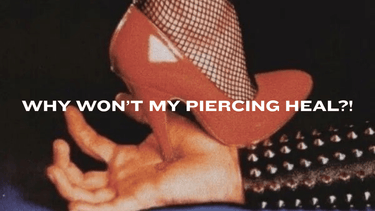
So you’ve finally got your dream helix, conch, or daith piercing - but months later, it’s still sore, swollen, or just not healing. If you’ve been asking yourself “why won’t my cartilage piercing heal?” you’re not alone.
Cartilage piercings take longer to heal than lobes (usually 6–12 months), and if you’re experiencing bumps, irritation, or delayed healing, it often comes down to a few common mistakes. The good news? Most are fixable.
Here are the five most common reasons your cartilage piercing won’t heal, and exactly what to do about it.
1. You’re Wearing the Wrong Metal
One of the biggest reasons cartilage piercings won’t heal is poor-quality jewellery. Metals like brass, nickel, or mystery alloys can cause reactions, keep the piercing inflamed, and even trigger cartilage bumps. Even stainless steel isn’t ideal for everyone, especially if you have sensitive skin.
The fix: Always choose implant-grade titanium jewellery. Titanium is hypoallergenic, lightweight, and the metal professional piercers recommend because it’s biocompatible with your body. At Smoothie, our Implantium™ flatbacks are 100% titanium - meaning no irritation, no tarnishing, and no drama.
2. You’re Sleeping on Your Piercing
Wondering why your cartilage piercing is swollen months later? Sleeping on it could be the reason. Pressure from pillows or headphones can cause irritation, cartilage bumps, and delayed healing.
The fix: Sleep on the opposite side, or invest in a piercing pillow with a hole in the middle.
3. It Was Pierced With a Gun, Not a Needle
If your piercing was done with a gun, healing is often trickier. Piercing guns force blunt jewellery through the cartilage, causing trauma and increasing the risk of infection or keloid-like bumps.
The fix: If your piercing was done with a gun and hasn’t healed after several months, visit a professional piercer. They may recommend re-piercing with a needle and fitting you with a titanium flatback for a smooth healing journey.
4. You’re Over-Cleaning (or Under-Cleaning)
When a piercing won’t heal, many people go overboard with cleaning — using harsh antiseptics, alcohol, or tea tree oil. But over-cleaning can dry out and irritate your skin, keeping it inflamed. On the flip side, not cleaning at all allows bacteria to build up.
The fix: Stick to a gentle saline solution once or twice a day. Don’t twist or spin your jewellery - this only reopens the wound.
5. You’re Wearing the Wrong Jewellery Style
Even if the metal is right, the style of jewellery matters. Butterfly backs, heavy hoops, or poor-quality studs can snag on your hair, headphones, or clothes - keeping your piercing irritated for months.
The fix: Wear flatback studs made of implant-grade titanium while your piercing heals. Flatbacks sit flush against your ear, won’t catch, and create the cleanest environment for your piercing to recover. Once it’s fully healed, you can swap them out for hoops and decorative styles without worry.
Final Thoughts: Why Titanium Is the Answer
If your cartilage piercing won’t heal, the jewellery is often the culprit. Choosing titanium flatbacks gives your piercing the best possible chance to heal — they’re hypoallergenic, waterproof, tarnish-proof, and trusted by professional piercers.
✨ Ready to heal your piercing in style? Explore our Titanium Cartilage Collection — designed for comfort, loved by piercers, and perfect for building your dream ear stack.



